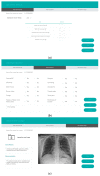Prototype Development of an Expert System of Computerized Clinical Guidelines for COVID-19 Diagnosis and Management in Saudi Arabia
- PMID: 33147715
- PMCID: PMC7662618
- DOI: 10.3390/ijerph17218066
Prototype Development of an Expert System of Computerized Clinical Guidelines for COVID-19 Diagnosis and Management in Saudi Arabia
Abstract
The increasing number of COVID-19 patients has increased health care professionals' workloads, making the management of dynamic patient information in a timely and comprehensive manner difficult and sometimes impossible. Compounding this problem is a lack of health care professionals and trained medical staff to handle the increased number of patients. Although Saudi Arabia has recently improved the quality of its health services, there is still no suitable intelligent system that can help health practitioners follow the clinical guidelines and automated risk assessment and treatment plan remotely, which would allow for the effective follow-up of patients of COVID-19. The proposed system includes five sub-systems: an information management system, a knowledge-based expert system, adaptive learning, a notification and follow-up system, and a mobile tracker system. This study shows that, to control epidemics, there is a method to overcome the shortage of specialists in the management of infections in Saudi Arabia, both today and in the future. The availability of computerized clinical guidance and an up-to-date knowledge base play a role in Saudi health organizations, which may not have to constantly train their physician staff and may no longer have to rely on international experts, since the expert system can offer clinicians all the information necessary to treat their patients.
Keywords: COVID-19 management; clinical guideline; expert system; mobile track and evolution of expert system.
Conflict of interest statement
The authors declare no conflict of interest.
Figures







Similar articles
-
A Trial of Favipiravir and Hydroxychloroquine combination in Adults Hospitalized with moderate and severe Covid-19: A structured summary of a study protocol for a randomised controlled trial.Trials. 2020 Oct 31;21(1):904. doi: 10.1186/s13063-020-04825-x. Trials. 2020. PMID: 33129363 Free PMC article.
-
Chemoprophylaxis, diagnosis, treatments, and discharge management of COVID-19: An evidence-based clinical practice guideline (updated version).Mil Med Res. 2020 Sep 4;7(1):41. doi: 10.1186/s40779-020-00270-8. Mil Med Res. 2020. PMID: 32887670 Free PMC article.
-
The atypical presentation of COVID-19 as gastrointestinal disease: key points for primary care.Br J Gen Pract. 2020 Jun 25;70(696):360-361. doi: 10.3399/bjgp20X710705. Print 2020 Jul. Br J Gen Pract. 2020. PMID: 32586825 Free PMC article. No abstract available.
-
Guidelines for Laboratory Diagnosis of Coronavirus Disease 2019 (COVID-19) in Korea.Ann Lab Med. 2020 Sep;40(5):351-360. doi: 10.3343/alm.2020.40.5.351. Ann Lab Med. 2020. PMID: 32237288 Free PMC article. Review.
-
Diagnostic Stewardship: An Essential Element in a Rapidly Evolving COVID-19 Pandemic.Mayo Clin Proc. 2020 Sep;95(9S):S17-S19. doi: 10.1016/j.mayocp.2020.05.039. Epub 2020 Jun 23. Mayo Clin Proc. 2020. PMID: 32807516 Free PMC article. Review. No abstract available.
Cited by
-
An IoT Framework for Screening of COVID-19 Using Real-Time Data from Wearable Sensors.Int J Environ Res Public Health. 2021 Apr 12;18(8):4022. doi: 10.3390/ijerph18084022. Int J Environ Res Public Health. 2021. PMID: 33921223 Free PMC article.
-
The Application of Computer Technology to Clinical Practice Guideline Implementation: A Scoping Review.J Med Syst. 2023 Dec 27;48(1):6. doi: 10.1007/s10916-023-02007-1. J Med Syst. 2023. PMID: 38148352
-
An AI healthcare ecosystem framework for Covid-19 detection and forecasting using CronaSona.Med Biol Eng Comput. 2024 Jul;62(7):1959-1979. doi: 10.1007/s11517-024-03058-3. Epub 2024 Mar 13. Med Biol Eng Comput. 2024. PMID: 38472600 Free PMC article.
-
Clinical decision support systems (CDSS) in assistance to COVID-19 diagnosis: A scoping review on types and evaluation methods.Health Sci Rep. 2024 Feb 20;7(2):e1919. doi: 10.1002/hsr2.1919. eCollection 2024 Feb. Health Sci Rep. 2024. PMID: 38384976 Free PMC article.
-
Effects of a Technology-Supported Decision, Reflection, and Interaction Approach on Nursing Students' Learning Achievement and Self-Efficacy in Professional Training: A Pilot Study.Healthcare (Basel). 2023 Apr 18;11(8):1164. doi: 10.3390/healthcare11081164. Healthcare (Basel). 2023. PMID: 37107998 Free PMC article.
References
-
- WHO Coronavirus Disease (COVID-19) Dashboard. World Health Organization. [(accessed on 17 May 2020)];2020 Available online: https://covid19.who.int.
-
- Kondylakis H., Tsiknakis M. Computerized clinical guidelines: Current status & principles for future research. Studies Health Technol. Inform. 2012;180:432–436. - PubMed
-
- Mujawar I., Swami S., Shikshan V. Comprehensive Study on Web Based Expert Systems for Disease. Int. J. Comput. Eng. Appl. 2017;11:9.
Publication types
MeSH terms
Grants and funding
LinkOut - more resources
Full Text Sources
Medical

